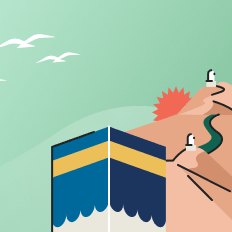**Brief Commentary**
• ‘**Anxiety (hamm)**’ is when a person experiences sadness and worries about something which will occur or may not occur i.e. it is related to the future.
• ‘**Grief (ḥuzn)**’ is when a person experiences sadness about something which has already occurred i.e. it is related to the past. For example, one may experience ‘ḥuzn’ over the death of a loved one.
• Anxiety and grief can both be debilitating, which is why the Prophet ﷺ taught us to seek protection from it. Ibn al-Qayyim writes, “Sadness weakens the heart and diminishes determination and wanting to go forward. There is nothing more beloved to Shayṭān than the sadness of a believer.”
• ‘**Inability**’ is not restricted to physical inability. It can also be mental or spiritual inability where a person does not have the strength to get up for ṣalāh, or to fast, or to part with their wealth; so we seek refuge in Allah from all forms of inability.
• We then seek protection from ‘**laziness**’. Sometimes we are able to do good, but we feel lazy to do it.
• Inability and laziness prevent a person from fulfilling his duties. Laziness deprives a person from immense good, as one prioritises personal rest over worshipping Allah and serving His creation. In this duʿā’, we are asking Allah to make us energetic and productive, and to save us from delaying our tasks (procrastination).
• ‘**Cowardice**’ can also lead to inability or may even lead to harm. Cowardice stops one from fulfilling one’s obligations, speaking the truth, defending the dīn and the oppressed, enjoining the good and forbidding the evil. Cowardice also stops one from doing good deeds in front of others (e.g. avoiding praying in a public place due to fear of embarrassment).
• ‘**Miserliness**’ is a great evil as it leads to a person neglecting his farḍ duties (e.g. zakāh, spending on his dependants) and missing out on the great rewards of other forms of spending (e.g. ṣadaqah, honouring one’s guests). Islām is a dīn of giving and generosity. Similarly, the miserly person is the one who does not invoke ṣalawāt on the Prophet ﷺ when he is mentioned in his presence.
• ‘**Being overcome by debt**’ is when a person has no control over their financial situation and has no one to turn to. This duʿā reminds us that we always have Allah with us to help us. Debt can weigh down upon a person, and can lead him to doing things which are unlawful. It may also cause him a lot of anxiety, and prevent him from worshipping Allah as he ought to.
• ‘**Being overpowered by men**’ is when a person has no control over their physical situation and has no one strong enough to turn to. This duʿā’ reminds us that we always have Allah with us to help us. Being overpowered by others could lead one to one feeling weak, humiliated and sad. This can negatively impact one’s ʿibādah. Sometimes it can lead to bitterness and hatred, and the desire for revenge.
` `
` `
** Action Points**
• This is a comprehensive duʿā’ in which our beloved Prophet ﷺ taught us to seek protection from eight things. Each of these is a substantial form of harm and we should not belittle these harms.
• There has been a rise in the number of people suffering from mental health problems. Similarly, the Ummah is facing unprecedented challenges on multiple levels. Thus, we should cling on to this duʿā’ and make it sincerely from the bottom of our hearts.
• Many of the above harms can be due to another human’s behaviour, so ensure your behaviour does not lead another Muslim to suffer from any of them. Just as we should ask Allah to protect us from being oppressed, we should ask His protection from being the oppressors.
• Since all of the things mentioned are difficult things that a Muslim may face, we should try to identify anyone who may be suffering from them and help them to overcome these problems.
• This is another duʿā’ where we seek refuge. This is a reminder once again that our real refuge is with Allah. Even if someone helps you, realise that it was Allah who facilitated that person’s help.
• When we experience difficulties, we should recite this duʿā’ with sincerity and conviction (yaqīn) that Allah will remove our sorrows and worries, just as He removed the worries of Abū Umāmah (raḍiy Allāhu ʿanhu) as mentioned in the ḥadīth above: “Then I did that, and Allah removed my worries and settled my debts.”




